Can Vs Could In English Grammar With Use and Examples
Can Vs Could In English Grammar
This article will teach Can Vs Could In English Grammar With Use and Examples. The use of can and could is essential for learning English Grammar. The English language is rich in its variety of verb tenses and moods, allowing speakers to convey different shades of meaning. Two commonly used modal verbs, “can” and “could,” are often confused due to their similar purposes. Understanding their proper usage is essential for effective communication. In this article, we will explore the uses of “can” and “could” in English grammar and provide examples to clarify their distinctions.
Here you will learn the definition of Can and Could
Can: Can is one of English’s most commonly used modal verbs. It can be used to express ability or opportunity, to request or offer permission, and show possibility or impossibility.
Could: Could is a modal verb that can be used to express a variety of meanings, including possibility, past ability, and politeness.
Importance Of English Grammar In the English Language
Here we are going to describe the importance of English Grammar in the English language. if you want to learn the English language it’s essential you have to strengthen your English Grammar. We know well Grammar is critical for learning any language. Because grammar sets many rules for learning a language ، grammar is never learned without the rules. Just as learning other languages requires learning the rules of grammar. Similarly, learning the English language requires you to learn the rules of English grammar If you don’t have proper knowledge about English grammar you can’t speak and Write the English language. English grammar also helps us make sense of our English words mean without learning English grammar you can’t make words and write. English grammar is an essential part of the English language. Learners must need to learn English grammar rules and how to use them in the English language.
Why Grammar Is So Important?
Grammar is very important within the English language because it provides information that helps the reader understand. You can say that English grammar is a structure that conveys precise meaning from the writer to the audience. With the help of English grammar, you can make and write many sentences and words in your daily life in English.
Use of Can And Examples
In this section, you will learn the use of can and examples. After learning this lesson you will understand the use of can with many Urdu to English examples.
Click on this link and Download the PDF of another Basic English grammar lesson.
Use Of It In English Grammar With Urdu Hindi Examples
کسی کی قابلیت بیان کرنے کے لیے کہ وہ کیا کر سکتا ہے۔۔ ہم “کین” ماڈل ورب کا استعمال کریں گے۔
Examples:
- I can drive.
- You can drive.
- He can drive.
- She can Drive.
For Negative Sentences:
- I cannot drive.
- You can’t drive.
- He can’t Drive.
For Interrogative Sentences:
- Can you drive?
- Can he drive?
Examples:
| Pakistan can contest any aggression. | پاکستان کسی بھی ہار جیت کا مقابلہ کر سکتا ہے۔ |
| She can speak English Fluently. | وہ روانی سے انگریزی بول سکتی ہے۔ |
| What can I do for you? | میں آپ کی کیا مدد کر سکتا ہوں؟ |
| Tell him that he can come in. | اس سے کہو کہ وہ اندر آسکتا ہے۔ |
| You can go home now. | اب آپ گھر جا سکتے ہیں۔ |
| Can you put out your cigarette۔ please? | کیا آپ براہ مہربانی سگریٹ بجھا سکتے ہیں؟ |
| I can drive. | میں چلا سکتا ہوں۔ |
( Passive= can be ):
| He can be sent to jail. | اس کو جیل بھیجا جا سکتا ہے۔ |
Use of Can get:
(جب کوئی کام خود کرنے کی بجائے کسی اور سے کر وایا جائے تو can get کے بعد مفعول کی انگریزی لگا کر فعل کی تیسری فارم استعمال کرتے ہیں۔) مثلاَ
Examples:
| Your ability can get you appointed on this post. | آپ کی قابلیت آپ کو اس نوکری پر تعینات کر واسکتی ہے۔ |
| You can get me trained. | آپ مجھے تربیت دلو ا سکتے ہیں۔ |

Cannot but + 1st verb In English Grammar
In this section you will learn can’t but+1st verb in English grammar. This section will provide many examples and how to use can’t but+ 1st verb in English
(جب کوئی ضرورت ،مجبوری ،لاچاری،پابندی،اور بے قابوجذبے یا خیا ل کا اظہار مقصود ہو تو اس طرح کے فقرات استعمال کرتے ہیں)
Examples:
| I can’t but admire the beauty of this garden. | آپ اس مذاق پر ہنسی روک سکتے۔ |
| Can’t you but play? | کیا آپ کھیل کے بغیر رہ نہیں سکتے؟ |
| I can but praise the decision. | مجھے فیصلے کی داد دینا پڑتی ہے۔ |
| I couldn’t but accept my fate. | مجھے اپنی تقدیر کو تسلیم کئے بغیر کو ئی چارہ نہیں تھا۔ |
| She couldn’t but weep. | وہ روئے بغیر نہیں رہ سکی۔ |
Can’t keep + 4th verb:
| You can not keep laughing at this joke. | آپ اس مذاق پر ہنسی روک سکتے۔ |
| You can’t keep touching this flower after you have seen it with your own eyes. | اس پھول کو اپنی آنکھوں سے دیکھنے کے بعد آپ (اس کو چھوئے) بغیر نہیں رہ سکتے۔ |
| She could not keep uttering her laughter. | وہ اپنی ہنسی نہ روک سکی۔ |
| You could not keep jumping into the river when he saw a child drowning. | جب اس نے ایک بچے کو ڈوبتے پا یا تو بے اختیار دریا میں کود پڑا۔ |
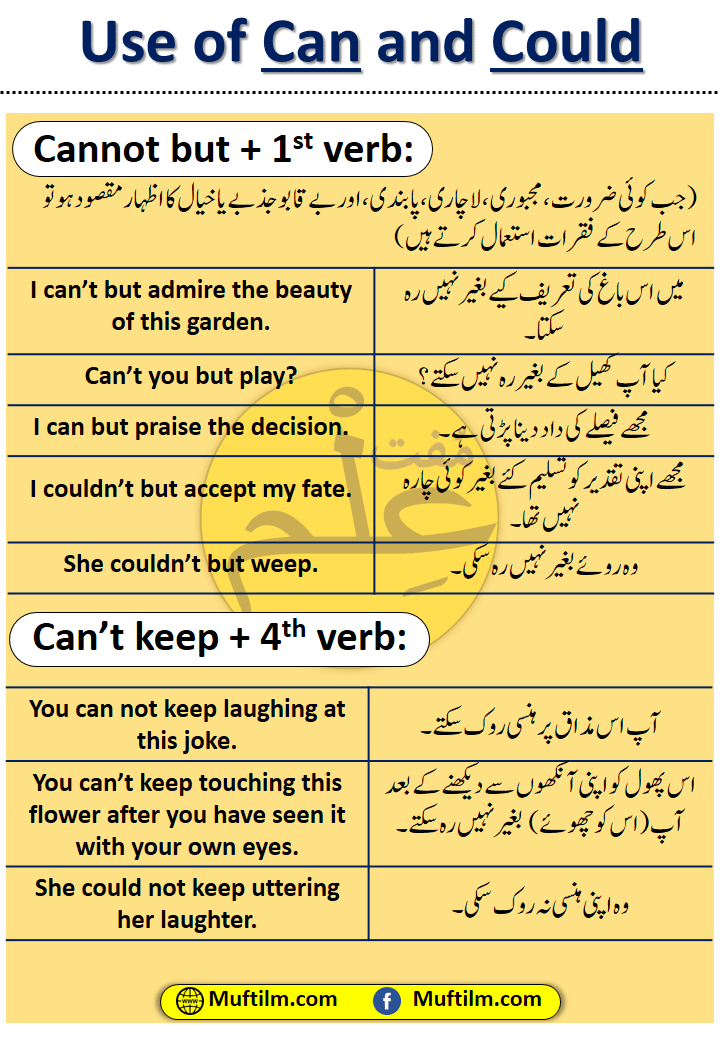
Can’t help + 4th verb:
(جیسا کہ الفاظ سے بھی ظاہر ہے،ہم can کے ساتھ keep کی جگہ help کو بھی لگا سکتے ہیں۔ معافی و مفہوم میں کوئی فرق نہ ہے )
(Present):
| He cannot help crying over the acute pain. | وہ شدید تکلیف پر کراہے بغیر نہیں رہ سکتا۔ |
(Past):
| She could not help running aside to see the speedy car. | وہ ایک تیز رفتار کار دیکھ کر ایک جانب دوڑے بغیر نہ رہ سکی۔ |
| The depressed persons could not help migrating. | مظلوم لوگ ہجرت کیے بغیر نہ رہ سکے۔ |
(Future):
| You cannot help laughing to see that film. | آپ اس فلم کو دیکھ کر بے اختیار ہنس پڑیں گے۔ |
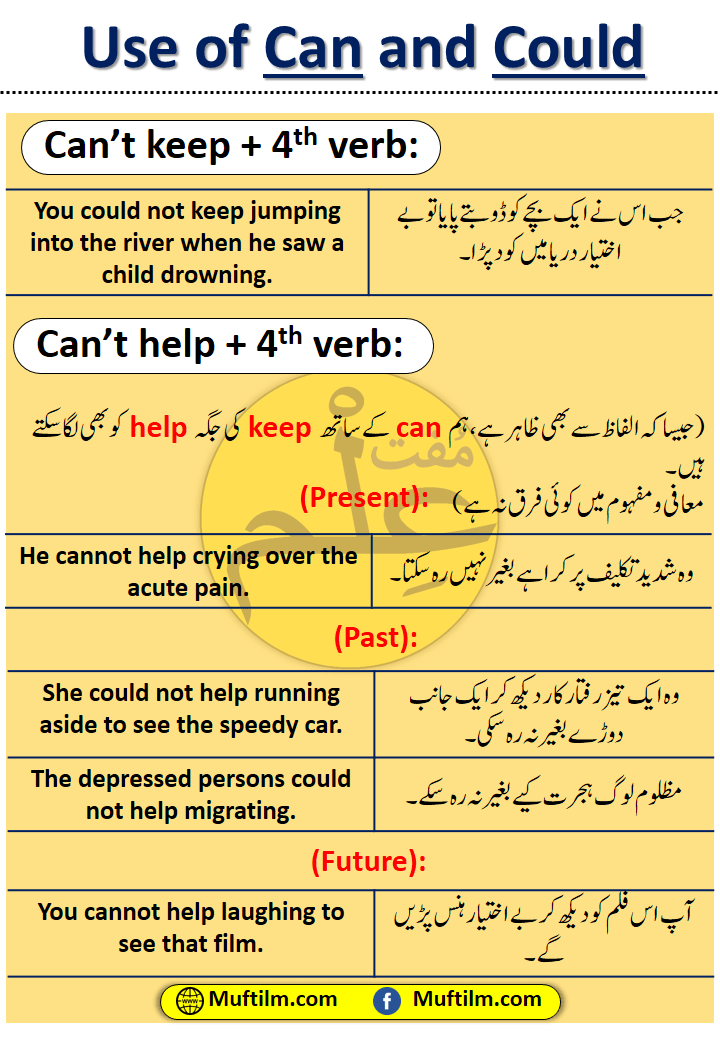
Use of Could
Here, you will detail learn the use of could in English Grammar. In this section, we will provide definition of could and Urdu to English Examples
(کسی شدید خواہش کے اظہار کے لئے could کو زمانہ حال میں can کی جگہ استعمال کر سکتے ہیں)
Examples:
- I could run fast when I was a child.
- I could play Snooker.
- She could sing well in her.
For Negative Sentences: Could not = couldn’t
- I could not run fast when I was a child.
For Interrogative Sentences:
Could you drive a car when you were a student?
(Simple Present expressing strong desire):
| Could you help me? | کیا آپ میری مدد کر سکتے ہیں؟ |
| I could go there whenever I wish/ want. | میں جب چاہوں وہاں جا سکتا ہوں۔ |
| I could sacrifice for my country! | بہت جی چاہتا ہےاپنے ملک کے لیے قربان ہو جاؤں! |
| We should present in the service of our nation whatever we could do. | ہم جو کچھ بھی کر سکیں ،اپنی قوم کے لیے پیش کر دینا چائیے۔ |
| What could I do for you? | میں آپ کے لیے کیا کر سکتا ہوں؟ |
| You could do much if you wish. | آپ چاہیں تو بہت کچھ کر سکتے ہیں۔ |
| What could she do for you, is only sympathy. | وہ آپ کے ساتھ ہمدردی ہی تو کر سکتی ہے۔ |
| You must go there if you could have some time. | آپ ضرور وہاں جائیں اگر آپ کو کچھ وقت مل سکے۔ |
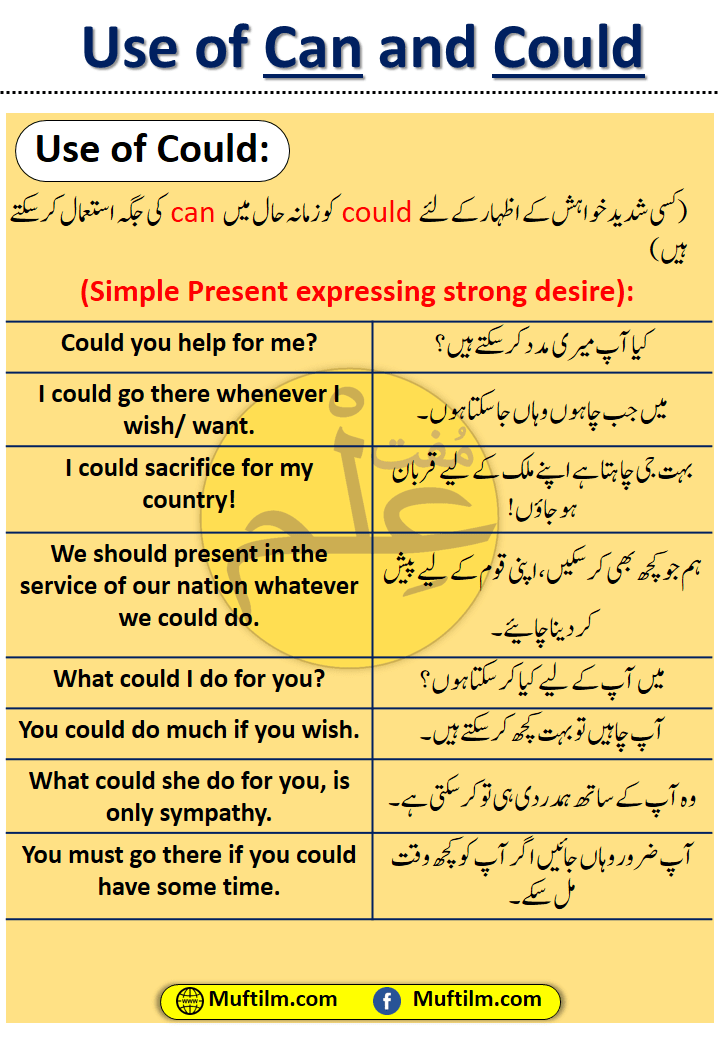
Use of Could(simple past)
(The use of “Could” (Simple past):
| I could conduct you in that matter. | میں اس معاملہ میں آپ کی رہنمائی کر سکتا ہے۔ |
| I couldn’t attend college on account of my illness. | بیماری کی وجہ سے میں کالج نہ جا سکا۔ |
| You could lift the carton if you tried. | اگر آپ کوشش کرتے تو آپ کارٹن اُٹھا سکتے ہیں۔ |
| Owing to the preparation of my examination. I couldn’t go to Lahore. | امتحانات کی تیاری کی وجہ سے میں لاہور نہ جا سکا۔ |
| I could not go out due to the severe cold. | میں شدید ٹھنڈ کی وجہ سے باہر نہ جا سکا۔ |
| We couldn’t meet our destination for want of oil in the car. | ہم کار میں تیل کی کمی کی وجہ سے اپنی منزل پر نہ پہنچ سکے۔ |
| (Passive): Could he be summoned here? | کیا اس کو یہاں بلایا جا سکتا تھا؟ |
| The Problem could be solved. | یہ مسئلہ حل کیا جا سکتا تھا۔ |
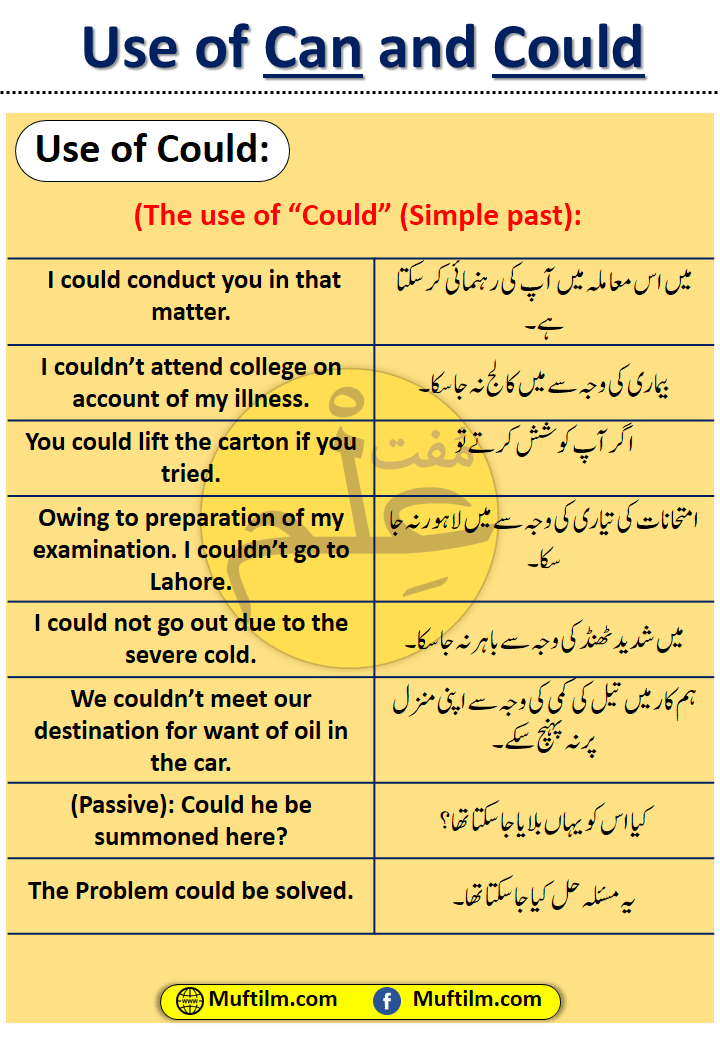
Could have + 3rd verb:
(In conditional sentences (Past Active):
| If you had reached there in time, you could have caught the train. | اگر آپ وقت سے ذرا پہلے پہنچ جاتے تو گاڑی پکڑ سکتے تھے۔ |
| If she hadn’t reached there on time, she could not have met her child. | اگر بروقت نہ پہنچتی تو اپنے بچے سے مل نہ سکتی تھی۔ |
| If you had planted the tree, You could have eaten its fruit. | اگر آپ نے درخت لگایا ہوتا تو آپ اس کا پھل کھا سکتے تھے۔ |
Could have been + 3rd verb (Passive):
| The letter could have been replied to if I had got it. | خط کا جواب دیا جا سکتا تھا بشر طلیکہ یہ مجھے مل جاتا۔ |
| If the police had seen him, he could have been caught. | اگر واپس اسے دیکھ لیتی تو وہ پکڑا جا سکتا تھا۔ |
| Could the patient have been operated on if he was seriously injured? | اگر مریض شدید زخمی تھا تو کیا اس کا اپریشن ہو سکتا تھا؟ |
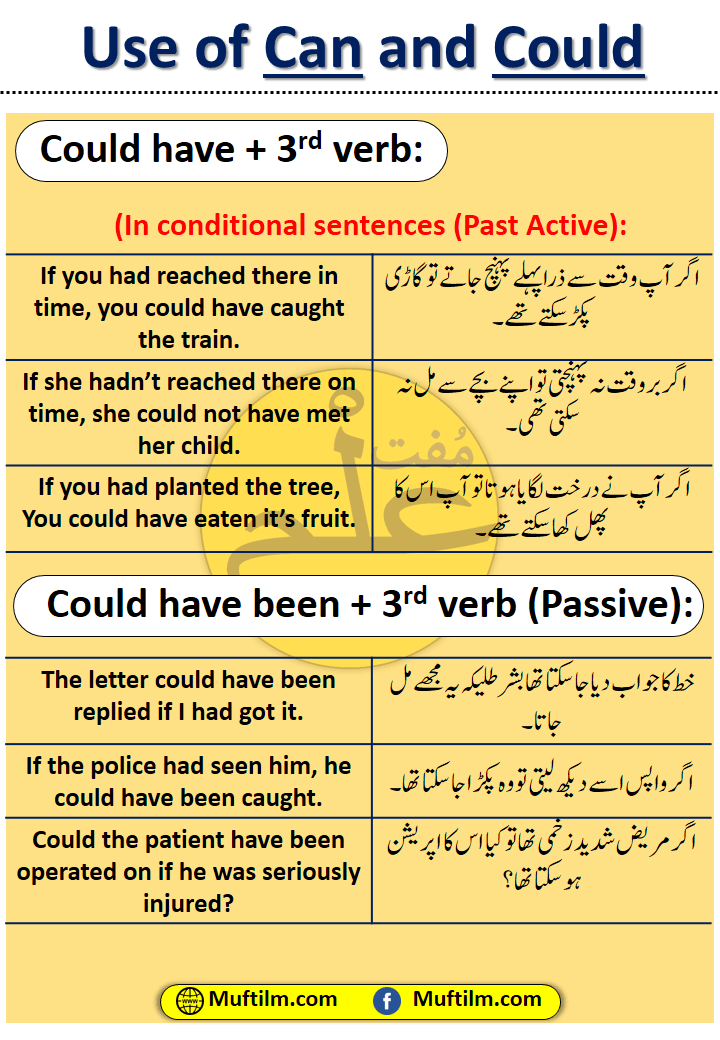
Could (Future):
| If you could come, we would be pleased . | اگر آپ تشریف لائیں گے تو ہمیں خوشی ہو گی۔ |
| You arrival could result in the joining of the two parties. | آپ کی آمد دونوں گروہوں کو ملانے کا سبب ہو گی۔ |
| If you could go to market, Purchase some books for me please. | اگر آپ کا بازار جانا ہو تو میرے لیے کچھ کتابیں خرید لائیے گا۔ |
| Ok. I’ll go and see what I could buy for your there. | ٹھیک ہے، میں جاؤں گا اور دیکھوں گا کہ آپ کے لیے وہاں کیا خرید سکتا ہوں۔ |
Could be + noun
| I would be thankful if there could be some help on your part. | اگر آپ کی طرف سے کچھ مدد ملے گی تو میں آپ کا شکریہ ادا کروں گا۔ |
| He could be a nice fellow. | وہ ایک اچھا ساتھی ہو سکتا تھا۔ |

Can Vs Could In English Grammar With Use and Examples
Here is the link to the Unique Use of Can and Could Pdf. This PDF will help you to revise this lesson later. So click on the below PDF button and save this pdf in your brwoser.
Conclusion Of This Lesson
I hope this article has helped you to understand the difference between can and could. If you have any further questions, please feel free to ask. Understanding the distinctions between “can” and “could” is crucial for effective communication in English. “Can” is used to express present ability and permission, while “could” is employed for past ability, polite requests, and hypothetical situations. Remember to consider the level of politeness and indirectness associated with each modal verb, as it can greatly impact the tone and formality of your communication. By mastering the use of “can” and “could,” you can enhance your language skills and express yourself more accurately in various contexts.
